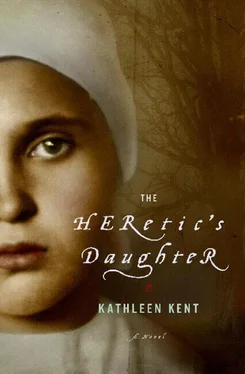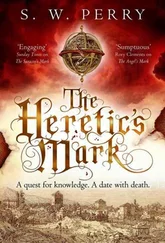“She is very ill and like to die. The doctor says there is nothing left to be done. Unless…” And here she left off and a dawning understanding made the skin on my scalp shrink. She leaned in closer to me and said in a forced whisper, “Heal her, and you will never lack for food. As long as you are here.” I looked beyond her expectant eyes and saw an endless procession of days spent imprisoned, slowly starving or not, depending on the goodwill and whim of my jailers. She took my silence for consent and left me to the wondering looks of my cell mates.
In the early morning hours of September the 22nd the skies opened up and poured an ocean onto the houses and people of Salem Town. The water ran in streams and rivulets down pathways and alleys, pooling around casements and flooding into cellars and half cellars alike. The riven streets became ponds over which people and animals had to jump to cross, or find themselves wet to the knees. And when Sheriff Corwin opened the cellar door to walk with his deputies down to the corridor, a low cascade of water licked at their boot heels. The two deputies shook the rain off their greatcoats as the sheriff led Samuel Wardwell out of the men’s cell. Sarah Wardwell was given a place by the short wall and held the baby up so that her husband could see his infant child through the bars. When he had been led up the stairs, the seven old women were brought hobbling and shivering from their cell. They made their way slowly and deliberately up the glassy steps, stopping only to assist the ones who faltered or stumbled, until they passed through the outer door, their footsteps washed over with rainwater.
Martha Corey, Alice Parker, Mary Easty, Ann Pudeator, Wilmot Reed, Mary Parker, Margaret Scott, and Samuel Wardwell went to their deaths claiming their innocence. But when the executioner’s cart became mired in a rut on the pathway up to Gallows Hill, the onlookers cried, “Look, the Devil hinders the cart.”
The day following the executions, Sheriff Corwin went with his deputies and seized property and goods belonging to the Parkers and the Wardwells. They were claimed for the Crown but the Corwins got the best of it. Mary Parker’s sons were able to buy back their property, but Sarah Wardwell would return to her farm to find that every animal, every stalk of corn, every movable bit of furniture, including her husband’s carpentry tools, had been taken and sold for coin. On that Friday, the 23rd, the sheriff’s daughter died and when his wife did not appear to make her rounds, I knew with a certainty that there would be no more gifts of food from her.
HYSSOP FOR COUGH. Rosemary for fever. A sprig of mint to cleanse ill humors from the mouth. Slippery elm for the midwife. Horse chestnut for stiffness of limb. Golden bough for palsy. But what is the cure for rage? Chamomile can calm. Perhaps with enough of that and a strong physic of black powder and salts it can be purged from the body. What of a restless mind that will not sleep at its appointed hour? A pillow of lavender or a sleeping draught made of equal parts of rum and water with sweet balm will suffice.
And what finally of the tortures of a guilty soul? What concoction is there that can be chewed and swallowed and downed in the belly to force the poison of self-recrimination back through the pores in the skin? In what organ of the body does it reside? A seeping wound can be bound. Salve can be dabbed to a burn or a swelling bubo. Poison can be drawn with a leech, or a lance. But guilt is a ghost that takes the shape of the body it inhabits and consumes all that is tender within its shell: brain, bowels, and heart. I cannot pluck it out like a splinter of glass or treat it with herbal brews.
I hear a keening sound start up close by. The old woman with the rotted tooth does not, cannot, stop moaning. The doctor has come, entreating her to let him pull it out. Her sisters in captivity have pleaded and begged and hounded her to tie to it some bit of string so that its rotten stump can be yanked from her swollen jaw. But she will not. She clamps her hand over her mouth and moans and moans and moans until I think I shall start screaming and never stop.
It is full-on night. I watch her rocking back and forth, her bare feet stuck out in front of her, the toes curling and uncurling in pain. There is something about the way in which her thin white legs are revealed from the bottom of her shift that is poignant and awful in their nakedness. Something uncoils from my memory and suddenly I see a bare leg come rising up out of a shallow grave. I try to push the thought away, for I know it is not a real memory. Only one that has been conjured into my mind from overhearing the other women in the cell. They have been talking and passing stories from one to the other. Stories that have come from their families. About the hangings. And the burials afterward. The dead. They are cut down and dragged by the remnants of their ragged clothes or by the ends of the hangman’s ropes to shallow graves close by. Into which they are rolled. Thin dirt shoveled over them. So thin that parts of the bodies show through. George Burroughs, his shirt and breeches pulled as loot from his body, laid in some rocky place. Covered over but for his chin and one of his hands, which uncurls from the soil as if beckoning. Lying next to him is Goodman Willard. And, hush, hush, quietly now, the girl is near to hearing, listen to what has come of Goody Carrier. She lies next to him. With one leg propped out of the rocks. As though waiting to step out of her grave.
The moaning woman has reached her fingers into her mouth and I pray as I have never prayed before that we could exchange our torments. That I could have the agony of her festering jaw if she could carry the agony of what I have done. She starts to work her hand frantically and I begin to see a thin trickle of blood running down the back of her hand through her fingers. She brings her other hand to her lip to pull it out of the way as she works and works at her tooth. She wrenches the tooth as she claws with her nails the flesh around it until she has torn it out of her mouth. She gazes stunned for a few moments at the black kernel in her hand and then a look of complete and swooning relief comes over her face as she holds out to me her demon, her lips bloody and smiling. I lie down in the straw, facing away from her, as close to Tom as I can get, my demon still writhing within me.
WHEN DR. AMES came the next day, I would not sit up to greet him or even look at him. He asked Tom if I had been eating and placed his ear against my chest to hear the beating of my heart. When he was satisfied he sat back and, taking my hand, said, “Sarah, you must keep faith that your innocence will be shown to the court. There are even now petitions being sent to the governor from many important people. Ministers from Boston, and your own Reverend Dane, are appealing directly to the Reverend Increase Mather, Cotton Mather’s father, to try to redirect some reason into these trials.”
He lowered his head closer to mine to better catch my eye and continued, “Many of us are taking up a collection to offer bail for your release. And the release of the other children.”
I thought of returning to the ruined shell that had been my home. The rooms cluttered from lack of care. The cooking hearth cindered and tarred from no brush to the flue. The fields overgrown and untamed from the attentions of only one man. Five separate souls circling about the empty place in each room. Looking but finding no grave in which to put an end to their despairing.
“Sarah, I know you mourn for your mother, but she is in that place in which we all hope to be.”
“She is in a shallow pit,” I said, my voice hollow and flat.
He looked narrowly at the women around him, shaking his head and furrowing his brow as though he would shame them all with his eyes, and said softly so that only Tom and I could hear him, “Your father did not leave her in that terrible place. He has buried her properly, that I can promise you. He and a good many of the other families have returned under the cover of night and have taken their loved ones away to secret places.”
Читать дальше












